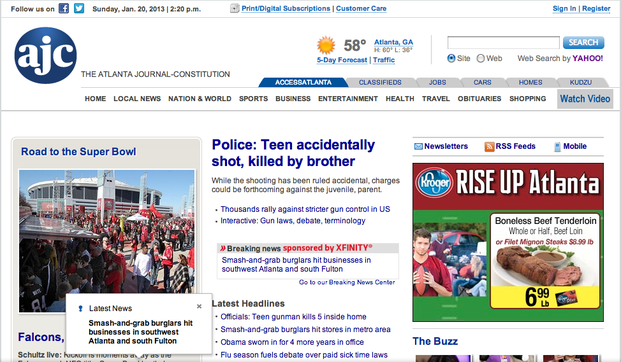I was both impressed and disappointed by the BBC's coverage of President Barack Obama's second inauguration. After watching the inauguration live on NBC from the comfort of my own couch, I quickly turned to my computer and logged on to BBC.com to check out their media strategy.
There was only one article posted after the event ended, and still the article above is the only one that remains. In my previous blog post I indicated that I enjoyed the BBC's one sentence/one graph writing style because it was to the point. However, in the case of a Presidential Inauguration I expected the article to have more flavor to it. I liked that they included two videos from the inauguration, but I would have preferred the videos to feature more than Obama repeating his oath of office. Other news publications made videos that featured various highlights from the event. I had a better understanding of the day after watching those videos than I did watching the videos included in the BCC's article.
While watching the Inauguration I was simultaneously checking up on my twitter feed and took notice of the BBC's presence. When navigating the website I was surprised I could not recover any of the tweets I had seen. I started to dig deeper, and stumbled across the page I was looking for: a live screening of the inauguration with a sidebar of keynotes and tweets from a representative at the scene.
Although it looks rather simple, I found this page to be an excellent tool for foreigners to follow the inauguration. With the large fan base President Obama has, it makes sense that an event this big should be seen by people around the world. Finding this page reaffirmed my attitude toward the BBC, because although they are based thousands of miles away, they are still a top competitor among U.S. based news publications.
An important aspect the BBC failed to mention in any of its coverage of the inauguration was the significance of the inauguration falling on Martin Luther King Jr. Day. Since the British do not celebrate the same holidays as Americans, their reporters may have felt it wasn't necessary to emphasize the correlation between a black man being sworn in as president on a day dedicated to our country's most famous Civil Rights activists. Again, I was disappointed by the lack of spirit.
Overall I think the BBC's coverage of President Obama's second inauguration was well done, but dry. The BBC delivered in social media content and video, but failed to present the story in a unique manner. If I were to follow the BBC on an event as big as this again, I would look for updates on their twitter feed rather than their website. The BBC twitter feed provided coverage that went beyond Obama's speech and included pictures and updates throughout the entire day.
There was only one article posted after the event ended, and still the article above is the only one that remains. In my previous blog post I indicated that I enjoyed the BBC's one sentence/one graph writing style because it was to the point. However, in the case of a Presidential Inauguration I expected the article to have more flavor to it. I liked that they included two videos from the inauguration, but I would have preferred the videos to feature more than Obama repeating his oath of office. Other news publications made videos that featured various highlights from the event. I had a better understanding of the day after watching those videos than I did watching the videos included in the BCC's article.
While watching the Inauguration I was simultaneously checking up on my twitter feed and took notice of the BBC's presence. When navigating the website I was surprised I could not recover any of the tweets I had seen. I started to dig deeper, and stumbled across the page I was looking for: a live screening of the inauguration with a sidebar of keynotes and tweets from a representative at the scene.
Although it looks rather simple, I found this page to be an excellent tool for foreigners to follow the inauguration. With the large fan base President Obama has, it makes sense that an event this big should be seen by people around the world. Finding this page reaffirmed my attitude toward the BBC, because although they are based thousands of miles away, they are still a top competitor among U.S. based news publications.
An important aspect the BBC failed to mention in any of its coverage of the inauguration was the significance of the inauguration falling on Martin Luther King Jr. Day. Since the British do not celebrate the same holidays as Americans, their reporters may have felt it wasn't necessary to emphasize the correlation between a black man being sworn in as president on a day dedicated to our country's most famous Civil Rights activists. Again, I was disappointed by the lack of spirit.
Overall I think the BBC's coverage of President Obama's second inauguration was well done, but dry. The BBC delivered in social media content and video, but failed to present the story in a unique manner. If I were to follow the BBC on an event as big as this again, I would look for updates on their twitter feed rather than their website. The BBC twitter feed provided coverage that went beyond Obama's speech and included pictures and updates throughout the entire day.


 RSS Feed
RSS Feed